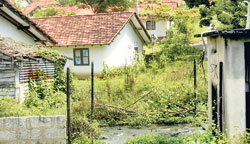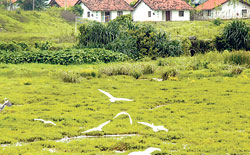With the country’s protracted war ending earlier this year, the problems of Internally Displaced People (IDPs) became the focus. However, come December, the plight of another group of people, who like the IDPs, faced the trauma of losing their kith and kin, homes and belongings, jolts our conscience. Five years after the tsunami, life is still an ordeal for some of them.
At first glance, the Turkish Village in Midigama, Matara — 450 houses built at a cost of about Rs. 760 million— seems a haven. But a pervasive stench from the village’s non-functioning waste treatment plant is making life unbearable for these tsunami survivors. Some have even left the housing scheme.
The village was built after a group of Turkish officials came to Sri Lanka to look into the welfare of Turkish nationals, affected by the 2004, December 26 tragedy. Seeing the devastation caused by the tsunami, to the local people, they were moved to help. Following an appeal made by the Honorary Consulate of Turkey in Sri Lanka to the Turkish government, arrangements were made through the Turkish Red Crescent, to build houses for some of the affected.
 |
| Affected houses and an abandoned paddy field (Below). |
 |
By December 23, 2006, the project was completed and houses were handed over to the beneficiaries selected by the Divisional Secretariat, among whom were some categorised as tsunami sub families.
But now this tsunami community feels they have fallen ‘from the frying pan to the fire’. The toilets have not been usable for the past six months. “We don’t have individual drainage pits here; all the sewage lines in this housing scheme are connected to one common line which is channelled to a waste-recycling plant. But the plant doesn’t function anymore, and the moment it stopped functioning our toilets began to overflow. The dirt runs through the houses and roads,” a resident lamented.
The sewage treatment plant works by collecting sewage from all the houses and transferring it to 10 different collection points in the scheme. Waste from here is in turn pumped to a central tank where the water and waste is recycled. Purified water is channelled to a lake nearby.
Houses built on the slope are the worst affected. The Sunday Times also learns that the power supply to the plant has been disconnected by the CEB due to an outstanding bill amounting to nearly Rs. 14 lakhs.
Thusitha Sameera, one of the occupants says that of about 450 houses, as many as 100 have been abandoned by the occupants due to this problem. “The children who were living in the scheme started falling ill; I decided to send my two-month-old baby to my mother-in-law’s house as I feel it’s not safe to keep the baby here,” he said.
Dilani Dissanayake, who moved here from Pelana says that the stench is unbearable. The authorities have been informed about this issue several times but no solution has been found, she complained.
The stench has even spread beyond the village. Those in the neighbourhood approached the Sunday Times to tell us that they too have become victims. “Our paddy fields have to be abandoned because all the overflowing waste comes right down to our paddy fields,” the agitated farmers in the area said.
J.V. Milinona, said her son had to abandon the paddy field her family had been cultivating for generations. “Even my great grandfather was a farmer; to us, buying rice from the shop was unheard of. But now we have no other option. It’s a great financial loss too,” she said.
Wekada, Kompawala, Beliketiya, Bamunugoda, Ampawela are some of the surrounding villages affected.
Weligama Pradeshiya Sabha Chairman A. Indika Sri Mangala said they don’t have the resources to maintain the waste recycling system. “It’s a big challenge for us as we don’t have the resources or the capacity to handle it. Where garbage collection and street maintenance is concerned, we are providing those services to this scheme,” he said. This system, he says is more suited to places like airports, because even the smallest blockage can affect it leading to water stagnation.
They have also appealed to the Turkish government to continue maintaining the recycling plant. A committee has been appointed to look into the matter, he said.
Weligama Divisional Secretary E.A.C Vidanagamarachchi said that the monthly bill of the plant amounts to about Rs. 90,000. Initially the plant was funded by the special tsunami unit set up under the District Secretariat which has now concluded its task. “In addition it was to be maintained by the income generated by the shop house complex built inside the scheme. But nobody was interested in buying the shops,” she said.
She said the authorities have come up with two solutions; one, to restart the plant or to build individual septic pits for each household. “In the first option, paying the electricity bill is going to be a problem. We asked if the villagers are willing to contribute monthly for the bill, but they said they could not afford it. So we are now looking at the second solution which is more practical,” she said.
The company involved in consultation for the Turkish village project said they advised the Turkish donors against this plan, as it would not be practical. “The original plan was to have individual soakage pits and septic tanks for each house but a group of Turkish environmentalists came to see the project and wanted to install a sewage treatment plant for the village. We told them it would be a big task to maintain and they said they would push the government to maintain it. They paid the electricity bill for a while, but you can’t expect them to keep paying the bills,” the chairman of the company said.
Building separate septic tanks for each house in the scheme would cost about Rs. 20-25 million, he added.
Stressing this was a government to government ‘gift’, Consul General of the Republic of Turkey, Bharathi Wijeratne, says that the Turkish government assisted the plant in terms of maintenance for one and half years and since it was an outright gift, would not continue to do so.
“We are trying to persuade the Turkish authorities to fund the move to build individual septic tanks as it is a viable solution to the issue. As a last resort, I have written to the UN as well to see if any of its agencies could come forward to give assistance,” she says.
Meanwhile, the village built with all good intentions is now a stinking problem for its occupants who see no way out of the mess they are in. |


